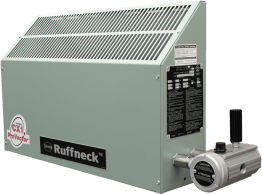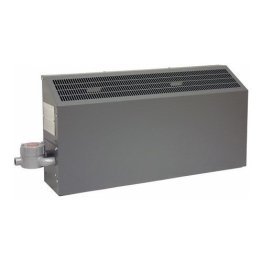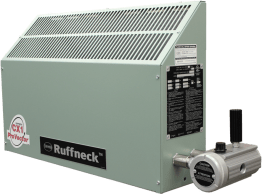Ruffneck CX1 ProVector Series Explosion Proof Convection Heater 34121 BTU 10.0kW 400V 1Ph CX1-400160-100-T2A-IIB
Ruffneck CX1 ProVector Series Explosion Proof Convection Heater 34121 BTU 10.0kW 415V 1Ph CX1-415160-100-T2A-IIB
Ruffneck CX1 ProVector Series Explosion Proof Convection Heater 34121 BTU 10.0kW 480V 1Ph CX1-480160-100-T2A-IIB
Ruffneck CX1 ProVector Series Explosion Proof Convection Heater 34121 BTU 10.0kW 600V 1Ph CX1-600160-100-T2A-IIB
Ruffneck CX1 ProVector Series Explosion Proof Convection Heater 10271 BTU 3.01kW 380V 3Ph CX1-380360-0301-T3-IIB
Ruffneck CX1 ProVector Series Explosion Proof Convection Heater 11362 BTU 3.33kW 400V 3Ph CX1-400360-0333-T3-IIB
Ruffneck CX1 ProVector Series Explosion Proof Convection Heater 12250 BTU 3.59kW 415V 3Ph CX1-415360-0359-T3-IIB
Ruffneck CX1 ProVector Series Explosion Proof Convection Heater 16378 BTU 4.8kW 240V 3Ph CX1-240360-048-T2A-IIB
Ruffneck CX1 ProVector Series Explosion Proof Convection Heater 16378 BTU 4.8kW 277V 3Ph CX1-277360-048-T2A-IIB
Ruffneck CX1 ProVector Series Explosion Proof Convection Heater 16378 BTU 4.8kW 480V 3Ph CX1-480360-048-T2A-IIB
Ruffneck CX1 ProVector Series Explosion Proof Convection Heater 16378 BTU 4.8kW 600V 3Ph CX1-600360-048-T2A-IIB
Ruffneck CX1 ProVector Series Explosion Proof Convection Heater 21360 BTU 6.26kW 380V 1Ph CX1-380160-0626-T2A-IIC
Ruffneck CX1 ProVector Series Explosion Proof Convection Heater 25488 BTU 7.47kW 415V 1Ph CX1-415160-0747-T2A-IIC
Ruffneck CX1 ProVector Series Explosion Proof Convection Heater 17060 BTU 5.0kW 277V 1Ph CX1-277160-050-T3-IIC
Ruffneck CX1 ProVector Series Explosion Proof Convection Heater 12761 BTU 3.74kW 415V 1Ph CX1-415160-0374-T3-IIC
Ruffneck CX1 ProVector Series Explosion Proof Convection Heater 17060 BTU 5.0kW 380V 1Ph CX1-380160-050-T3-IIC
Ruffneck CX1 ProVector Series Explosion Proof Convection Heater 17060 BTU 5.0kW 415V 1Ph CX1-415160-050-T3-IIC
Ruffneck CX1 ProVector Series Explosion Proof Convection Heater 17060 BTU 5.0kW 400V 1Ph CX1-400160-050-T3-IIC
Ruffneck CX1 ProVector Series Explosion Proof Convection Heater 17060 BTU 5.0kW 480V 1Ph CX1-480160-050-T3-IIC
Ruffneck CX1 ProVector Series Explosion Proof Convection Heater 17060 BTU 5.0kW 600V 1Ph CX1-600160-050-T3-IIC
Markel Hazardous Location Convector 25938 BTU 7600 Watt 240V 1 Phase FEP-7624-1RA
Ruffneck CX1 ProVector Series Explosion Proof Convection Heater 16378 BTU 4.8kW 277V 3Ph CX1-277360-048-T2A-IIC
Ruffneck CX1 ProVector Series Explosion Proof Convection Heater 25932 BTU 7.6kW 240V 3Ph CX1-240360-076-T2A-IIB
Ruffneck CX1 ProVector Series Explosion Proof Convection Heater 25932 BTU 7.6kW 277V 3Ph CX1-277360-076-T2A-IIB
Ruffneck CX1 ProVector Series Explosion Proof Convection Heater 25932 BTU 7.6kW 480V 3Ph CX1-480360-076-T2A-IIB
Ruffneck CX1 ProVector Series Explosion Proof Convection Heater 25932 BTU 7.6kW 600V 3Ph CX1-600360-076-T2A-IIB
Ruffneck CX1 ProVector Series Explosion Proof Convection Heater 17060 BTU 5.0kW 208V 1Ph CX1-208160-050-T3-IIC
Ruffneck CX1 ProVector Series Explosion Proof Convection Heater 16378 BTU 4.8kW 208V 3Ph CX1-208360-048-T2A-IIB
Markel Hazardous Location Convector 25938 BTU 7600 Watt 480V 3 Phase FEP-7648-3RA
Ruffneck CX1 ProVector Series Explosion Proof Convection Heater 16241 BTU 4.76kW 380V 3Ph CX1-380360-0476-T2A-IIB
Ruffneck CX1 ProVector Series Explosion Proof Convection Heater 11840 BTU 3.47kW 400V 3Ph CX1-400360-0347-T3-IIB
Ruffneck CX1 ProVector Series Explosion Proof Convection Heater 12761 BTU 3.74kW 415V 3Ph CX1-415360-0374-T3-IIB
Ruffneck CX1 ProVector Series Explosion Proof Convection Heater 17060 BTU 5.0kW 240V 3Ph CX1-240360-050-T3-IIB
Ruffneck CX1 ProVector Series Explosion Proof Convection Heater 17060 BTU 5.0kW 277V 3Ph CX1-277360-050-T3-IIB
Ruffneck CX1 ProVector Series Explosion Proof Convection Heater 17060 BTU 5.0kW 380V 3Ph CX1-380360-050-T3-IIB
Ruffneck CX1 ProVector Series Explosion Proof Convection Heater 17060 BTU 5.0kW 400V 3Ph CX1-400360-050-T3-IIB
Ruffneck CX1 ProVector Series Explosion Proof Convection Heater 17060 BTU 5.0kW 415V 3Ph CX1-415360-050-T3-IIB
Ruffneck CX1 ProVector Series Explosion Proof Convection Heater 17060 BTU 5.0kW 600V 3Ph CX1-600360-050-T3-IIB
Ruffneck CX1 ProVector Series Explosion Proof Convection Heater 34121 BTU 10.0kW 240V 3Ph CX1-240360-100-T2A-IIB
Ruffneck CX1 ProVector Series Explosion Proof Convection Heater 34121 BTU 10.0kW 277V 3Ph CX1-277360-100-T2A-IIB
Ruffneck CX1 ProVector Series Explosion Proof Convection Heater 34121 BTU 10.0kW 380V 3Ph CX1-380360-100-T2A-IIB
Ruffneck CX1 ProVector Series Explosion Proof Convection Heater 34121 BTU 10.0kW 400V 3Ph CX1-400360-100-T2A-IIB
Ruffneck CX1 ProVector Series Explosion Proof Convection Heater 34121 BTU 10.0kW 415V 3Ph CX1-415360-100-T2A-IIB
Ruffneck CX1 ProVector Series Explosion Proof Convection Heater 21360 BTU 6.26kW 380V 3Ph CX1-380360-0626-T2A-IIC
Ruffneck CX1 ProVector Series Explosion Proof Convection Heater 34121 BTU 10kW 480V 3Ph CX1-480360-100-T2A-IIC
Ruffneck CX1 ProVector Series Explosion Proof Convection Heater 34121 BTU 10kW 600V 3Ph CX1-600360-100-T2A-IIC
Ruffneck CX1 ProVector Series Explosion Proof Convection Heater 25932 BTU 7.6kW 208V 3Ph CX1-208360-076-T2A-IIB
Ruffneck CX1 ProVector Series Explosion Proof Convection Heater 17060 BTU 5.0kW 480V 3Ph CX1-480360-050-T3-IIB
What Safety Certifications Should Your Explosion Proof Heater Have?
Understanding safety certifications for explosion proof heaters prevents costly compliance violations and protects your workforce. Class I Division 1 and 2 ratings indicate suitability for environments with flammable gases or vapors present continuously or intermittently. Class II ratings cover locations with combustible dust hazards. Your heater should carry NEC (National Electrical Code) and NFPA certifications matching your facility's hazard classification. Beyond basic certifications, look for T-codes that specify maximum surface temperatures. A T3A rating keeps surface temperatures below 180°C, critical for preventing ignition in petroleum processing areas. Many facilities require both UL and CSA approvals for insurance compliance. Our product specialists help match the right certification levels to your specific application, preventing both under-specification and unnecessary over-engineering of your heating system.
How Do You Calculate BTU Requirements for Hazardous Areas?
Calculating proper BTU output for explosion proof heaters requires accounting for both space volume and air exchange rates typical in hazardous locations. Start with the basic formula: cubic feet of space multiplied by desired temperature rise multiplied by 0.133 equals required BTUs per hour. Hazardous areas often feature higher ventilation rates for safety, increasing heat loss by 25-40%. A 10,000 square foot warehouse with 20-foot ceilings and standard hazardous area ventilation needs approximately 120,000 BTUs to maintain a 40-degree temperature rise. Consider door traffic, insulation quality, and process heat losses when finalizing capacity. Multiple smaller units often provide better temperature distribution than single large heaters while offering redundancy if one unit requires maintenance.
What's the Real Cost Difference Between Standard and Explosion Proof Models?
Explosion proof heaters typically cost 40-60% more than standard units upfront, but the investment protects against catastrophic losses. A standard 100,000 BTU heater might cost $2,500, while its explosion proof equivalent runs $3,500-$4,000. This premium covers robust enclosures, specialized electrical components, and rigorous testing protocols. Operating costs remain comparable since heating efficiency stays consistent across both types. The real value emerges in risk mitigation: one incident in a hazardous location can result in millions in damages, regulatory fines, and operational downtime. Insurance premiums often decrease with properly certified equipment, offsetting some initial costs. Many facilities recover the price difference within 18-24 months through reduced insurance rates and eliminated citation risks.
Why Shop at Industrial Fans Direct for Explosion Proof Heaters?
Industrial Fans Direct brings over 20 years of expertise helping facilities navigate complex hazardous location heating requirements. Our team focuses on matching you with the right equipment, not maximizing order values. We maintain strong manufacturer relationships that translate to competitive pricing, with our Low Price Guarantee. Our technical specialists understand NEC classifications, helping you avoid specification errors that delay projects or fail inspections.


















































